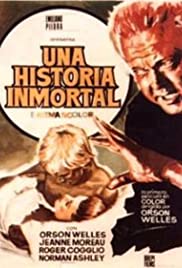
THE IMMORTAL STORY
France, 1968, 58 minutes, Colour.
Jeanne Moreau, Orson Welles, Roger Coggio, Norman Eshley, Fernando Rey.
Directed by Orson Welles.
The Immortal Story was intended as part of an anthology of stories by Karen Blixen, author of Babette’s Feast, portrayed by Meryl Streep in her biographical story, Out of Africa. The film was commissioned by French television. However, other parts of the intended film were not made. The film has been adapted by Orson Welles who also directed and plays a central role.
Orson Welles had astounded the cinema world with Citizen Kane just over a quarter of a century earlier. A maverick director, he had made a number of interesting films including versions of Shakespeare’s Othello and Macbeth as well as Chimes at Midnight. He also made classics like Confidential Report and A Touch of Evil. This was his first venture into colour film.
The setting is Macau in the 19th century. Welles plays Mr Clay, a very rich merchant in the town who is ageing and childless. He likes to tell stories – and recounts one about a woman who was impregnated by a sailor in order to give a child to a childless father. With his assistant, he decides to repeat the experiment for himself – with Jeanne Moreau, the mistress of another sailor and his assistant finding a sailor who could be the surrogate father. This is what happens – an immortal story, of a man wanting immortality.
The film is striking, not prurient despite the theme of the film. It is yet another example of Orson Welles’ skill as writer, director and actor.
1. How interesting a fable? How did it engross the audience? How important war it that it played for just under an hour? How did it communicate? The small location, time, few characters? The use of colour? Did this seem to be for the audience an immortal story?
2. What was the basic story in itself? What were its main characteristics? Is it an Immortal story? How was the story told and how did it correspond to the story we saw? What are the basic implications of the story of Clay, Virginia, and Paul? What are the values of stories and why do they interest audiences? Why do stories attract and audiences respond to their implications?
3. In what way was the story immortal? What is immortal about a story which is forever told? The facts are in the past so that the story lives on? What of the grand overtones of the word 'immortal'? Nobility and grandeur? Did this story have nobility and grandeur?
4. How did the story make Clay immortal? Why did he want it to make him Immortal? How did he play God in arranging the story to be lived out? He had heard the story and wanted control over it. What were the implications of this for an immortal story?
5. Could the audience identity with Clay? The basic significance of his name and human clay? The defiance of Clay trying to be God? The arrogance of a man ordering his own immortality? Can humans do this? response to Clay manipulating his characters? The fact of Clay being old and trying to gain an Immortality before he died? Was this the only way he could gain Immortality? What did Clay's character have to say about life, death.
6. How attractive a character was Virginia? The virginal implications of her name and their irony? Her costume and white? The fact that she was the sailor’s daughter? was she a puppet for Clay? How did she live out the story? Did she contribute to it? In any way create it? What effect did the story have on her? Her role at the end? Was anything achieved for her? Immortality?
7. Why was Paul brought into the film? Brought into the story? Another sailor? The fact that he could be bought for money, a puppet of Clay? The quality of his relationship with Virginia? effect on him? Was there any love? Did he achieve any immortality? What did he offer to Clay?
8. Was there any significance in the location besides its exotic Oriental nature and a port where sailors called? Where stories and legends were circulated, where a man like Clay was at home and yet not at home?
9. How important for the whole film and its themes was the servant? His wisdom in advising Clay, his power over Clay,, yet his obedience to him, a proof for Clay and yet an interpreter of meaning? How was he a prophet and his quotation from the prophets? What insight into the whole experience did he have? How was he a true prophet for Clay trying to be God? Was he a false prophet?
10. The significance of the prophecies he quoted from the prophet Isaiah and their implications? The relationship of prophecies and stories? Prophecies as immortal stories, giving insight for all generations? Prophecies? God for humans? Were the prophecies important to the themes of this film?
11. The significance of Clay's final encounter with Virginie?
12. What had Clay achieved by the end of the film? What had he achieved in death? Was it appropriate that he should die at the end of the film? In this way? Was the story true?